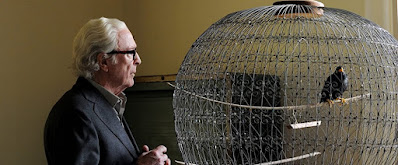or
"Hum a Few Bars and I'll Fake It"
Where do you go when the music stops?
Switzerland, evidently. Composer Fred Ballinger (Michael Caine) is at a luxurious swiss spa with some other artists dealing with crises in their careers: film-maker Mick Boyle (Harvey Keitel) is working on his "testament" film—the one that will last as a classic—with a scruffy team of writers, actor Jimmy Tree (Paul Dano) who is chilling out and contemplating the route to his next role (he's worried because all people-on-the-street know him as is a favorite sci-fi character). Also, there are a famous sports figure, Diego Maradona (Roly Sorrano), the current Miss Universe (Mãdãlina Ghenea), and a parade of habitué's who are taking "the cleanse." Also, there's Fred's daughter Lena (Rachel Weisz), who is also his assistant, and who has issues with Dad about the "every-day" of being his employee and the lifetime of being his daughter.
Fred, see, is stuck. He hasn't written a thing in years, and has no real desire to. He's "retired." Retired, but remembered. He has been asked (by the Queen's stuffy emissary) to conduct one of his pieces, "Simple Song #3," at Prince Phillip's birthday concert. There's even a knighthood for him thrown into the deal. He refuses for reasons he won't reveal, other than "he doesn't perform anymore." Nor does he compose. If anything, he's "decomposing."
This is the problem. Fred won't "reveal" anything. It's why he's a composer. Music doesn't require words—it simply "is," reflecting feelings more akin to the real emotions than just mere words can express. Not that Fred can't express himself—he does and frequently, but just not about his own feelings. That's where the music is, and he's not writing it down on paper and he's not having it performed. But, the music is still there. In his head. Where it will remain. He'll broach no argument about it. And that is the way he conducts himself.
Such an interior existence is, of course, not unsocial, just selective. Mick has been his friend for years and the two can talk about anything or anyone, and they have shared boundaries that they do not cross to make the exchanges easier to navigate smoothly. They understand each other, which is a goal of Lena's, which she's having trouble negotiating. She doesn't understand anything these days, as he husband has just left her for some pop-star—"the most obscene job in the world"— (Paloma Faith) who makes music-videos. Was it her? Is it him? It can't be...the other her—so shallow!
Fred has very specific reasons why he's retired, all deeply personal and not to be revealed, until later in the film. But, Fred has the luxury of choice. Everybody else at the spa...at least, the prominent ones, the celebrated ones...are equally stymied and stuck in place. Mick has a concept, a grand scheme for his next film, but is dependent on a gaggle of screenwriters (Sorrentino doesn't even give them names, just attributes, Disney dwarves!) out of whom he tries to coach some profundity and there's also his on-screen muse (Jane Fonda) that he must coax into appearing in it. He is entirely engaged in the process, even if he might not know what movie he's making.
Maradona is retired from soccer, but he's dealing with the cost of his fame and the lifestyle it has afforded him. He is very overweight, unhealthily so, and has grown accustomed to being indulgent and indulged.Miss Universe is spectacularly unapproachable, but worldly enough that she can cut down approaching suitors with a withering honesty.
And Jimmy? He's stuck in his own typecasting, looking to prove himself capable of more sophisticated roles and indulges in eccentric behaviors to express his depth. He wants to be perceived as deeper than his previous roles, which he thinks are shallow and puerile—he'll find out that those roles touched lives and have his crisis solved. Contrast that actor with Fonda's aging diva, who's far more practical—her choice is whether to take a role in Mick's magnum opus or to take on a television role for a fat paycheck.I was a big fan of Sorrentino's La Grande Bellezza—which had its own issues of aimlessness—but, one couldn't argue with the beauty of the images. I sought out seeing Youth in a theater in 2015, but struggled with my opinion of it—I hadn't written a review of it because I, frankly, didn't understand it and if I can't bring anything of value to any discussion of the film, best to say nothing at all. When when is stuck—as so many of the people in the film are—one can either blame themselves or the movie. And I'm reluctant to say that Sorrentino didn't have a solid concept to base his film around.

But, I think that's the case. In looking at the theme of age, self-worth, and self-perception, I think he found it wasn't enough to just concentrate on an inarticulate composer (I kept think of Ballinger as a stand-in for Jerry Goldsmith—a brilliant composer, but a terrible communicator about his "process," constantly saying "I just hear it in my head!"), and so took an Altman-esque approach, making a collection of short stories on the theme, rather than one over-all novel.
Mick lines up a shot for his proposed movie;
The movie he sees in his head, scattered individuals unrelated in a landscape.
As such, Sorrentino could have used the Mick-director character as a stand-in, looking for a story to fit the images he sees, rather they're related to each other or not. As such, I'm all for that. People are not monolithic—as much as the media, pollsters, statisticians, and business metrics want to pigeon-hole us. We all react to a given situation differently, we all have our ways of coping—some good, some bad, some effective, some utterly worthless. We learn that way. We grow, hopefully, even as we grow older and hopefully wiser.
Ultimately, the film feels very random. Much like life. Much like youth.
But, those images, though. Sorrentino has a particular "eye"—which I think is part of my point. I'm glad I saw Youth, as fleeting as it ultimately was.






















No comments:
Post a Comment